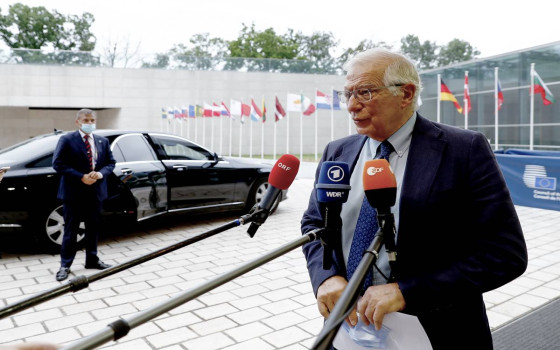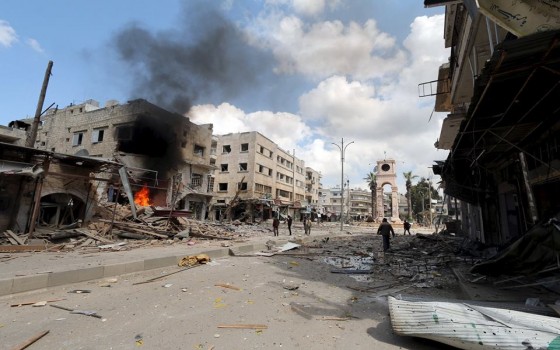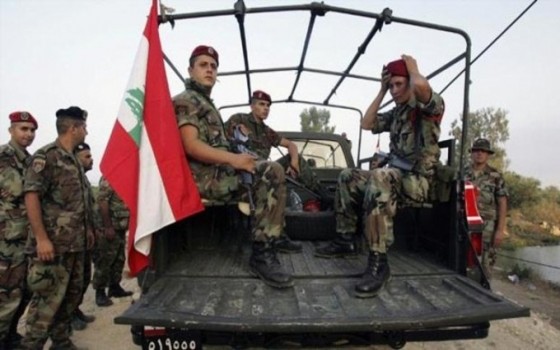
European message to the Paris conference: The confrontation between Hezbollah and Israel has made Lebanon more fragile and this is an important occasion to mobilize urgent political and economic support for the Lebanese people and their sovereignty

- Europe and Arabs
- Thursday , 24 October 2024 12:15 PM GMT
Brussels - Paris: Europe and the Arabs
A European delegation is participating in the Paris International Conference today to support the people of Lebanon and their sovereignty. According to what was issued by the European Union institutions, the High Representative for Foreign Affairs and Security Policy, Josep Borrell, is participating in the conference, as well as the European Commissioner in charge of crisis management, Janez Lenarcic. A statement issued on the eve of the conference by Borrell's office in Brussels stated that the military confrontation between Hezbollah and Israel is the cause of an unacceptable number of civilian casualties and an intolerable level of destruction throughout the country, making the situation of Lebanon - a country already affected by many crises - even more fragile.
The International Conference in Support of Lebanon, called by France in Paris on October 24, is an important occasion to mobilize urgent political and economic support for the Lebanese people and the country's sovereignty. As High Representative of the European Union for Foreign Affairs and Vice-President of the European Commission, I will carry a message outlining the main steps towards achieving this goal and the European Union's contribution to it.
According to various media reports, the French capital, Paris, is hosting today, Thursday, the international conference to support the people of Lebanon and its sovereignty, at the initiative of French President Emmanuel Macron, with the participation of 70 countries and 15 international organizations, in an embodiment of France's support for Lebanon and its continued efforts to ensure the security and stability of the country, which is suffering from the continued Israeli bombardment, especially in the south.
The international conference at the ministerial level aims to stop the fire in Lebanon and mobilize the international community in this regard, and maintain the stability of this country, which "suffers from a state of special fragility" due to the increase in violence and tensions on the Blue Line (the dividing line between Israel and Lebanon), as Lebanon suffers from a political crisis due to the institutional vacuum, and an economic crisis that has been hitting the country for several years, according to what a senior source in the Elysee stated.
The source explained that France wants to move forward towards a ceasefire to protect the civilian population, as there are many victims and their number is now higher than the 2006 conflict, "and it is important that we can move forward and provide tangible responses to the displaced and political responses to resolve the crisis." France is constantly pushing for a solution based on Security Council Resolution 1701, which ended the 2006 war between Hezbollah and Israel, and stipulates strengthening the deployment of the United Nations Interim Force in Lebanon (UNIFIL) and limiting the military presence in the border area to the Lebanese army and the international force.
For his part, French Foreign Minister Jean-Noël Barrot considered that this resolution "allows, on the one hand, to guarantee Lebanon's sovereignty and unity, and on the other hand, to give security guarantees to Israel so that the 60,000 people who were forced to leave their homes after October 7 in northern Israel can return to them."
The conference also aims to provide humanitarian aid and urgent relief needs to the Lebanese people and the displaced. According to UN statistics, the number of displaced people has reached more than 800,000, and according to the Lebanese government, more than one million displaced people in Lebanon, especially from the south.
In response to the United Nations' appeal to raise the necessary funds to help the displaced in light of the war between Israel and Hezbollah, France wants to reach at least $400 million at the international conference on Lebanon, to help the displaced who were forced to leave their homes to escape the increasing bombing.
On October 1, the United Nations agencies launched an appeal to raise this amount ($400 million) in order to provide urgent aid to hundreds of thousands of displaced people as a result of the Israeli strikes on several Lebanese regions.
The international conference also focuses on another priority, which is supporting Lebanon's sovereignty to help stabilize the country, as Lebanon has been suffering from an institutional vacuum, especially a presidential one, for more than two years. Therefore, the conference aims to identify ways to support and strengthen Lebanese institutions, especially the Lebanese Armed Forces, which ensure internal stability in the country, according to the French Foreign Ministry.
A source at the Elysee indicated that what France is doing falls within the framework of its historical commitment to Lebanon, recalling the previous conferences called for by Macron to support Lebanon, and the initiatives that were organized to support Lebanon and the Lebanese after the Beirut port explosion.
This conference comes as a continuation of France's efforts to mobilize the international community to express its solidarity with Lebanon, and to emphasize the importance of reaching a political solution and strengthening the elements of Lebanese sovereignty that would provide stability and help reach a ceasefire as soon as possible and a political solution based on Resolution 1701.
French Foreign Minister Jean-Noël Barrot had confirmed that Paris stands by Lebanon and "will not let it down," explaining that the goal is first to reaffirm the need for a ceasefire, reach a diplomatic solution, end hostilities, mobilize humanitarian aid from the largest possible number of countries, and support Lebanese institutions, most notably the Lebanese army.
After a year of exchange of fire on the border, confrontations between Israel and Hezbollah have increased, with Israel intensifying its airstrikes and beginning ground operations in southern Lebanon since late September. At least 1,552 people were killed in Lebanon in a month, according to figures from the Lebanese Ministry of Health, while the United Nations estimated the displacement of about 700,000 people.












No Comments Found